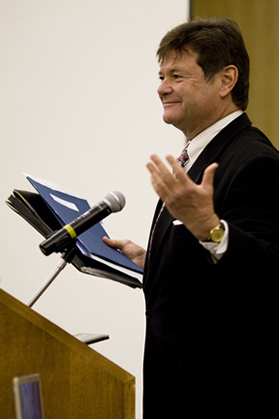
          |
Special Report from the Senate Select Committee on Florida's Inland Waters at the UF WI Symposium 2010

The Senate Select Committee on FloridaŌĆÖs Inland Waters, chaired by Senator Lee Constantine, was created on October 7, 2009 to listen and learn about major issues regarding water from constituents. A total of six meetings were held between December 2009 and February 2010, the last one being held on February 22nd, just prior to the WI Symposium.
Senator Constantine addressed the WI Symposium to give a brief update and answered questions from the audience.
On Thursday, March 11, 2010, the draft report on the Senate Select Committee on FloridaŌĆÖs Inland Waters was presented at a meeting to the Florida Senate outlining several themes that had emerged from the discussions with constituents throughout the State, reporting findings, and making recommendations. One of the 13 recommendations was ensuring the Legislature have access to recommendations based on the best available science by drawing on existing state water institutions, including the University of FloridaŌĆÖs Water Institute. Click on the following links for additional information on the actions of the committee.
Proposed Senate Bill 550 is the legislative work product intended to carry out the recommendations from the Select Committee. The initial version (S550) of Proposed Senate Bill 550 included reference to one of the recommendations in the Senate Select CommitteeŌĆÖs Draft Report to ensure the Legislature have access to recommendations based on the best available science by drawing on existing state water institutions, including the University of FloridaŌĆÖs Water Institute. Click here for the brief text analysis of initial version (S550).
The current status of the Senate Bill 550 is available on the Florida Senate Website.
Senator Constantine addressed the WI Symposium to give a brief update and answered questions from the audience.
On Thursday, March 11, 2010, the draft report on the Senate Select Committee on FloridaŌĆÖs Inland Waters was presented at a meeting to the Florida Senate outlining several themes that had emerged from the discussions with constituents throughout the State, reporting findings, and making recommendations. One of the 13 recommendations was ensuring the Legislature have access to recommendations based on the best available science by drawing on existing state water institutions, including the University of FloridaŌĆÖs Water Institute. Click on the following links for additional information on the actions of the committee.
Proposed Senate Bill 550 is the legislative work product intended to carry out the recommendations from the Select Committee. The initial version (S550) of Proposed Senate Bill 550 included reference to one of the recommendations in the Senate Select CommitteeŌĆÖs Draft Report to ensure the Legislature have access to recommendations based on the best available science by drawing on existing state water institutions, including the University of FloridaŌĆÖs Water Institute. Click here for the brief text analysis of initial version (S550).
The current status of the Senate Bill 550 is available on the Florida Senate Website.
The WI symposium feedback survey administered following the symposium included one question focused specifically toward the Senate Select Committee on FloridaŌĆÖs Inland Waters to which sixty-two participants responded.
If you could provide one recommendation to this committee, what would it be?
- Implement political, legislative and regulatory actions to protect waters
- Ensure that legislation is based on sound science and creating links with Academic institutions
- Consider new mechanisms for funding initiatives
- Protect Springs
- Encourage conservation and water use efficiency
- Support educational and outreach programs
- Support the use of ŌĆślocal sources firstŌĆÖ
- Consider the viability of EPA nutrient levels
